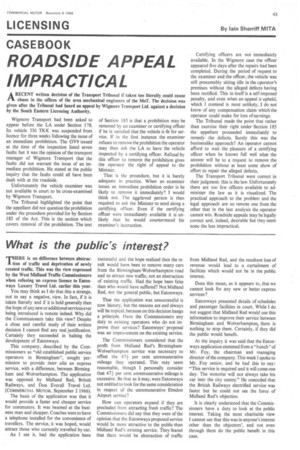What is the public's interest?
Page 45

If you've noticed an error in this article please click here to report it so we can fix it.
THERE is no difference between abstraction of traffic and deprivation of newly created traffic. This was the view expressed by the West Midland Traffic Commissioners when refusing an express licence to Eatonways Luxury Travel Ltd. earlier this year.
You may think as I do that this a strange, not to say a negative, view. In fact, if it is taken literally and if it is held generally then the hope of any new or additional services ever being introduced is remote indeed. Why did the Commissioners take this view? Despite a close and careful study of their written decision I cannot find any real justification. Certainly they succeeded in halting the development of Eatonways.
This company, described by the Commissioners as "old established public service operators in Birmingham", sought permission to provide inter alia an express service, with a difference, between Birmingham and Wolverhampton. The application was opposed by Midland Red, British Railways, and Don Everall Travel Ltd. (COMMERCIAL MOTOR, September 2 1966).
The basis of the application was that it would provide a faster and cheaper service for commuters. It was beamed at the business man and shopper. Coaches were to have a telephone installed for the convenience of travellers. The service, it was hoped, would attract those who currently travelled by car.
As I see it, had the application been successful and the hope realized then the result would have been to remove many cars from the Birmingham-Wolverhampton road and to attract new traffic, not an abstraction of existing traffic. Had the hope been false then who would have suffered? Not Midland Red, not the general public, but Eatonways.
That the application was unsuccessful is now history, but the reasons are and always will be topical, because on this decision hangs a principle. Have the Commissioners any duty to existing operators who do not improve their services? Eatonways' proposal was an improvement on the existing service.
The Commissioners considered that the profit from Midland Red's BirminghamWolverhampton service was necessary to offset the 471 per cent unremunerative mileage they operated. This may seem reasonable, though I personally consider that 471 per cent unremunerative mileage is excessive. Be that as it may, were Eatonways not entitled to look for the same consideration in respect of the unremunerative Elmdon Airport service?
How can operators expand if they are precluded from attracting fresh traffic? The Commissioners did say that they were of the opinion that the Eatonways proposed service would be more attractive to the public than Midland Red's existing service. They feared that there would be abstraction of traffic from Midland Red, and the resultant loss of revenue would lead to a curtailment of facilities which would not be in the public interest.
Does this mean, as it appears to, that we cannot look for any new or better express services?
Eatonways presented details of schedules and passenger facilities in court. While I do not suggest that Midland Red would use this information to improve their service between Birmingham and Wolverhampton, there is nothing to stop them. Certainly, if they did the public would benefit.
At the inquiry it was said that the Eatonways application stemmed from a "hunch" of Mr. Foy, the chairman and managing director of the company. This week I spoke to Mr. Foy senior, and he had this to say: "This service is required and it will come one day. The motorist will not always take his car into the city centre." He conceded that the British Railways electrified service was faster but he could not see the force of Midland Red's objection.
It is clearly understood that the Commis7 sioners have a duty to look at the public interest. Taking the most charitable view I cannot see that this was in anyone's interest other than the objectors', and not even through them do the public benefit in this case.








































































































































































